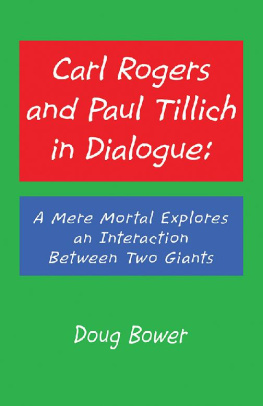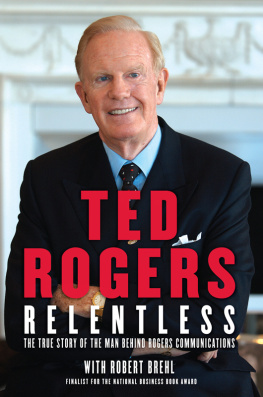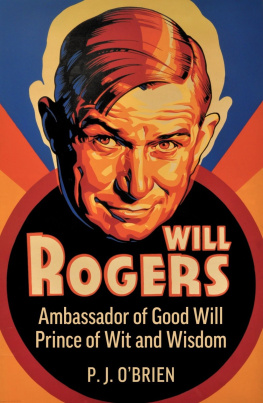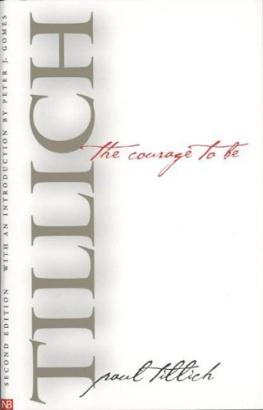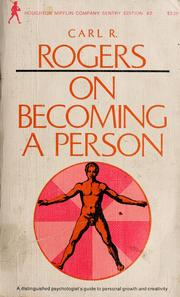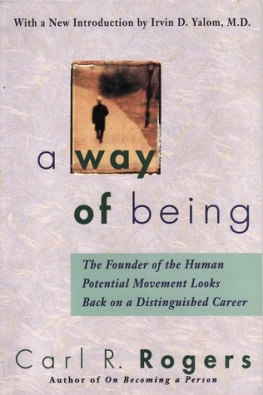Carl Rogers
and
Paul Tillich
in
Dialogue:
A Mere Mortal Explores
an Interaction
Between Two Giants
Doug Bower

Carl Rogers and Paul Tillich in Dialogue:
A Mere Mortal Explores an Interaction Between Two Giants
Copyright 2019 Doug Bower.
All rights reserved. No part of this book may be used or reproduced by any means, graphic, electronic, or mechanical, including photocopying, recording, taping or by any information storage retrieval system without the written permission of the author except in the case of brief quotations embodied in critical articles and reviews.
iUniverse
1663 Liberty Drive
Bloomington, IN 47403
www.iuniverse.com
1-800-Authors (1-800-288-4677)
Because of the dynamic nature of the Internet, any web addresses or links contained in this book may have changed since publication and may no longer be valid. The views expressed in this work are solely those of the author and do not necessarily reflect the views of the publisher, and the publisher hereby disclaims any responsibility for them.
Any people depicted in stock imagery provided by Getty Images are models, and such images are being used for illustrative purposes only.
Certain stock imagery Getty Images.
Scripture quotations from the Holy Bible, King James Version (Authorized Version). First published in 1611. Quoted from the KJV Classic Reference Bible.
Scripture quotations marked NASB are taken from the New American Standard Bible, Copyright 1960, 1962, 1963, 1968, 1971, 1972, 1973, 1975, 1977, 1995 by The Lockman Foundation. Used by permission.
ISBN: 978-1-5320-8933-6 (sc)
ISBN: 978-1-5320-8934-3 (e)
iUniverse rev. date: 12/09/2019
Contents

To my wife (Cheryl) and daughters (Katie & Erin) who probably would quickly understand how scrambled my dealing with Carl Rogers and Paul Tillich is. They would further understand how absurd it was/is to undertake this project. They would say, Yep, that is what he would do, take on a project over his head.

About 1967, or 1968, during a class on Human Relations Training, the director of the nursing program, Georgene DeChow, gave a lecture/demonstration on Carl Rogers and his approach to relating to clients. Whether, she held Rogers and the client-centered approach up as the standard for relating I do not know. Myself, I was intimidated by the woman and in psychoanalytic jargon was transferring all sorts of perceptions on her in terms of power. At any rate during her demonstration she was using reflection as a model of relating. And during that demonstration one of my classmates started asking questions in regard to what he was witnessing. I recall he felt skeptical of the approach to relating to people in such a manner. In his interaction, as he expressed his skepticism, Ms. DeChow kept reflecting his comments and concerns. Suddenly, he sat down. He appeared to me to suddenly feel being had. His own points came back to him and he realized she simply was returning to him what he said. She didnt argue with him, she returned his own points to him. I dont know if he felt he was understood, but he certainly didnt feel he was dealing with someone who was telling him, at least overtly, that he was wrong.
I started moving in a direction of using reflection to engage people as a helper and sometimes as a friend as I have never really been much of a conversationalist and reflection helped keep me engaged. The presentation by Ms. DeChow was to my recollection was my first exposure to Rogers.
I know regard reflection as a superficial means of making empathic responses and seldom use it anymore, even as I profess the Person-Centered Approach as my basic model of counseling and relating. That breadth of that is beyond the scope of Preface.
Some years later while I was studying at Columbia Theological Seminary in Decatur, Georgia, I took a course under Ben Kline. Dr. Kline had a reputation in the seminary community as an expert on Paul Tillich. Indeed, the course was about Tillich. I remember getting my brain scrambled trying to grasp Tillich. I still get my brain scrambled trying to deal with Tillich. This project didnt fix that. Yet, I have found myself fascinated by Tillich whom I came to see as closet Lutheran. I have tried to speak to that in this work. I make no claim that I was successful as great Christian theologians share common perspectives and who is to say if any given adherent is a Luther, Calvinist, or Wesleyan based on the perspectives they espoused. Who is even to say for instance that Luther was a Lutheran or a whatever-an (Ok, I made that up for this Preface). No great thinker creates in a vacuum.
So, I hope in all this the reader while join in the puzzlement, the scrambledness, and then feel led to make his or her own attempts to develop a project dealing with these giants.

Carl Rogers - Paul Tillich Dialogue
(Part A)
I n this verbatim, I tried to capture everything I could. It is not cleaned up to be grammatically correct. Thus, ah and um even show up. The speakers repeated their words. That too was captured. What you get is what I think I heard as best as I can convey it.
CARL ROGERS: The importance of self-affirmation: I think that would be one area where we agree. Then I have been much impressed with your thinking about the courage to be, because l that in psychotherapy; the courage of being something, the risk that is involved in knowing . Ive also liked your phrase about him the antimoral act being one that contradicts the realization of the individual, and it seems to me both of us are trying to push beyond some of the trends that are very prominent in the modern world; the logical positivistic, the ultra-scientific approach, the stress of the mechanistic and highly deterministic point of view which, as I see it, makes man just an object trying to find some alternative stance in relation to life. I wonder if you feel that were in some agreement on issues of that sort.
PAUL TILLICH: Yes, of course. In all these points I heartily agree, and I am very glad you enumerate them for me.
ROGERS: Well, perhaps we could push into some areas where I am not quite so sure. I wonder what some of your views are about the nature of man. When Ive been asked about that - I think some of the existentialists take the point of view that man really has no nature, but it seems to me that he has - I have taken the point of view that man belongs to a particular species. He has species characteristics. One of those, I think, being the fact that he has a I think he is incurably social; I think he has a deep need for relationships. Then I think that simply because man is an organism, he tends to be directional. Hes moving in the direction of actualizing himself. Ah So, um for myself, I really feel man does have a a describable nature. I have been um interested, for example, in the fact that you discuss the demonic aspects of man. I dont know whether you see that as a part of his nature - at any rate Id be Id be interested in your in your views in regard to the nature of man.
TILLICH: Your question is very far-reaching and demands of me a little bit longer answer. Ah The first point I want to make is that man, definitively, has a nature, and I think the best way to prove this is negatively, by showing how impossible it is if somebody denies that man has nature. I think of ah the famous French existentialist, Sartre, who has denied that man has nature and has emphasized that man man is everything he makes of himself and this is his freedom. But, if he says that this is mans freedom to make himself, then this, of course, means that he has a nature of freedom, which other species do not have. So, to make such statements is somehow self-contradictory. Even if you attribute to man what medieval theology attributed to God, namely, to be by himself, and not conditioned by anything else, even then you cannot escape the statement that man has a nature. Now thats my answer to the first element in your question, but there are two more and I want to get at them.
Next page
